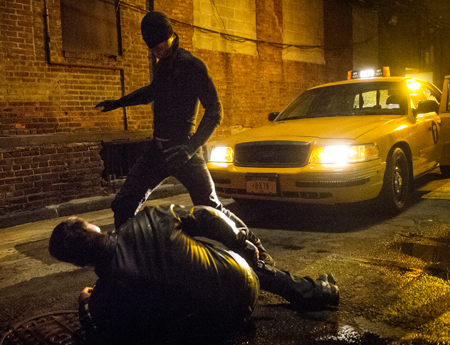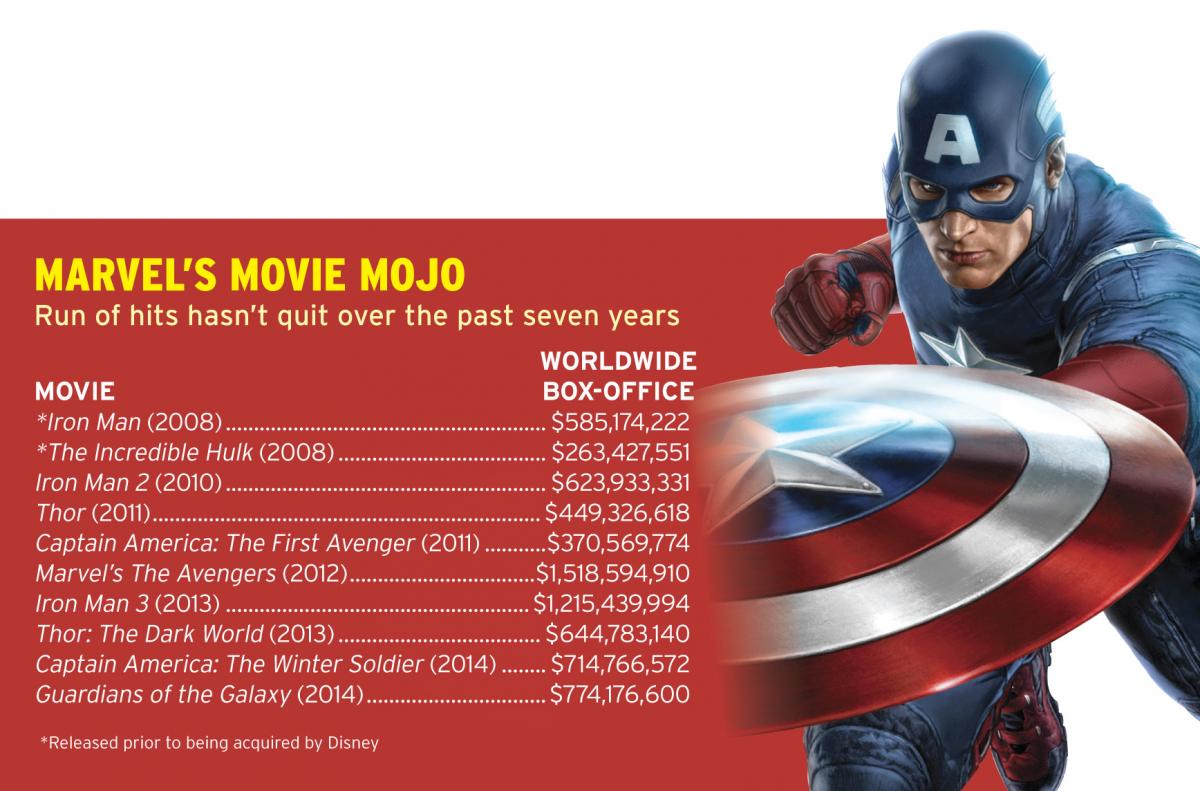With Netflix, Marvel Bets On ‘Daredevil’

The smarter way to stay on top of broadcasting and cable industry. Sign up below
You are now subscribed
Your newsletter sign-up was successful
Since the release of Iron Man in 2008, Marvel Studios, the comic book-based hit-maker has unleashed a string of hot releases that have grossed $7 billion at the box office worldwide. Last summer’s Guardians of the Galaxy—a film that counted an anthropomorphic tree and a gun-toting raccoon as main characters—soared to more than $774 million worldwide.
This summer, Marvel will likely see even bigger numbers for the hotly anticipated follow-up to 2012’s The Avengers and should see another big turnout for its pint-sized superhero Ant-Man. The box office alone has more than justified Disney’s 2009 purchase of Marvel for $4 billion.
However, despite all its box-office might, Marvel has found a foe that even Ultron, James Spader’s villianous robot that will tussle with the Avengers in Age of Ultron, would be jealous of: the small screen.
Despite premiering to much fanfare—and a large 4.7 rating with adults 18-49 in 2013—ABC’s Marvel-produced Agents of S.H.I.E.L.D. has seen its ratings plummet since. While the ratings have been mostly steady in its sophomore season, S.H.I.E.L.D. has drawn a considerably smaller audience. ABC’s second Marvel series, the Captain America spinoff Agent Carter, performed even worse despite coming in with much more critical praise.
Now Marvel is betting big that its Netflix series Daredevil debuting on April 10, about a blind man hellbent on cleaning up New York’s Hell’s Kitchen, can cure its small-screen ills.
Marvel TV head Jeph Loeb is undaunted by the TV struggles, however, arguing the episodic nature of the medium can be a boon creatively, allowing for more intimate storytelling. “What TV in its own way actually can do often times, I wouldn’t say better, [but tell stories] differently than a motion picture.”
The ascendance of superhero themed shows this season—seven different series airing on broadcast were adapted from DC or Marvel comics properties—would at first seem like a natural winner for TV after such stunning success at the box office, not to mention the built-in fan base.
The smarter way to stay on top of broadcasting and cable industry. Sign up below
But the masses largely have not been tuning in. Fox’s Batman prequel Gotham, is the only show that averages over a 2.0 rating in the advertiser-preferred demo. Though Arrow and The Flash have been success stories for The CW, the bar is much lower than at the Big four broadcasters. NBC’s attempt in Constantine, about a demon-hunter, failed to find any audience on Fridays and it’s too early to gauge The CW’s third DC Comics-inspired series iZombie.
The rampant expansion of superhero-themed series only figures to continue next season. CBS is getting into the game with Supergirl, Fox is developing Lucifer and The CW will further expand its DC output with its Flash-Arrow crossover series. With so many of these shows being adapted from comic book properties, do we need another hero?
“Do you ever say there are too many medical dramas? Do you think there is possible saturation of cop shows?” said Loeb. “If you pull it off successfully, nobody thinks of your show as [just] a genre show or a superhero show.”
DC has been much more aggressive than Marvel with its TV output. Part of that reason is due to the fact that DC considers its TV and film properties to exist completely separate from each other, while Marvel’s TV shows are an extension of its movie universe—a popular phrase from the studio is “It’s All Connected.”
For example, while Grant Gustin plays The Flash on The CW series, DC parent Warner Bros. is releasing a big-screen version in 2018, with Ezra Miller playing the speedster. While making the TV series an extension of its cinematic universe allows it to play in the same sandbox as the films, it also means that lesser-known characters will inhabit the TV part of that universe.
Netflix Series Are Departure From Marvel’s Brand
When Netflix releases Marvel’s Daredevil on April 10, it will be the first under its 2013 deal with Marvel, which includes live-action series based on the characters Luke Cage, Jessica Jones and Iron Fist. The 60-episode deal will culminate with an Avengers-style team-up miniseries The Defenders. For Netflix, the deal is a major part of the streaming service’s rampant expansion of original programming.
One of the noticeably different aspects of Daredevil is just how “un-Marvel” the series looked. While Loeb admits that being on a streaming service and not having to worry about broadcast regulations or MPAA ratings has given showrunner Steven DeKnight—whose previous credits include Starz’s Spartacus—the freedom to push the series into more of an adult world, he argues the show still fi ts in with the Marvel brand.
“When you look at it you go ‘Yea, that’s Marvel,’” Loeb said.
Inspired By Alien Invasion of NYC
Loeb said he got the idea for these Netflix series after watching the climactic battle scene in Avengers, where Earth’s mightiest heroes are fending off an alien invasion in midtown Manhattan. “That’s taking place over by Grand Central station. If you just go over a few avenues and down a few blocks, there is whole other world going on over there,” he said. “The Avengers are here to save the universe and the street level heroes are here to save the neighborhood.”
Loeb promises that Daredevil will definitely acknowledge its place in the Marvel universe, but will do in a much more subtle manner than S.H.I.E.L.D., which has derived its second season plot line from the events of Captain America: The Winter Soldier.

“We don’t ever want to ignore the fact that [Daredevil] is in this kind of world,” said Loeb, who continued that he wants these characters to stand on their own. “There are things that acknowledge where we are in various time lines.”
Marvel and Netflix are moving ahead with the other series. A.K.A. Jessica Jones, expected to premiere later this year, has mostly filled out the cast, with Krysten Ritter in the title role. Luke Cage has also cast its lead in Mike Colter and recently named Cheo Hodari Coker as the series’ showrunner.
“[Jessica Jones] starts a detective story and then turns into something else,” said Loeb. “[Luke Cage] will have a different flavor.”
A streaming service such as Netflix might end up being the perfect landing spot for these shows. While the live viewership for superheroes hasn’t been that high, these shows—which skew young—typically are among the highest gainers in delayed viewing.
During his session at the Winter TCA press tour, ABC Entertainment Group president Paul Lee championed S.H.I.E.L.D.’s delayed viewing numbers. “You look at the L3’s [live-plus-three] and the L7’s [live-plus-seven] and the C3’s and this show pops up,” Lee said.
Netflix’s “binge-viewing” model of releasing entire seasons of its shows on the same date appears to be in line with viewing habits of comic book fans. “I think [binge-watching] increases viewership,” said Daredevil star Charlie Cox during an appearance on CBS’ The Late Show on March 30. “It seems to be a proven model with the way people like to watch television these days.”
Mickey Loves Marvel
Since purchasing Marvel, the studio has been hugely important to Disney’s bottom line. It’s that importance that could force ABC to keep both Agents of S.H.I.E.L.D. and Agent Carter on the air, despite the lackluster ratings. Lee, however, brushed off any notions that there was pressure from above. “No, none at all. Absolutely none at all. This is really us. We drive this,” he said during his TCA session. “We have ambitions for Marvel in the future. We love Marvel.”
